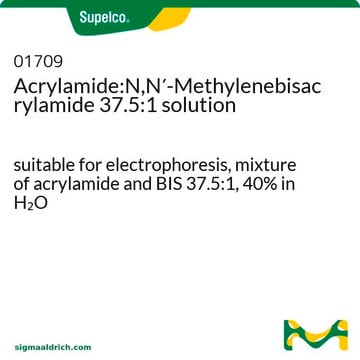A4058
Acrylamide solution
40%, suitable for electrophoresis, sterile-filtered
Synonym(s):
2-Propenamide, 40% Acrylamido solution, Acrylic amide, Akrylamid, Polyacrylamide solution
About This Item
Recommended Products
sterility
sterile-filtered
form
liquid
concentration
40%
technique(s)
electrophoresis: suitable
storage temp.
2-8°C
SMILES string
NC(=O)C=C
InChI
1S/C3H5NO/c1-2-3(4)5/h2H,1H2,(H2,4,5)
InChI key
HRPVXLWXLXDGHG-UHFFFAOYSA-N
Looking for similar products? Visit Product Comparison Guide
General description
Application
Preparation Note
Signal Word
Danger
Hazard Statements
Precautionary Statements
Hazard Classifications
Acute Tox. 4 Inhalation - Acute Tox. 4 Oral - Carc. 1B - Eye Irrit. 2 - Muta. 1B - Repr. 2 - Skin Irrit. 2 - Skin Sens. 1 - STOT RE 1 Oral
Target Organs
Peripheral nervous system
Storage Class Code
6.1C - Combustible acute toxic Cat.3 / toxic compounds or compounds which causing chronic effects
WGK
WGK 3
Flash Point(F)
Not applicable
Flash Point(C)
Not applicable
Personal Protective Equipment
Regulatory Listings
Regulatory Listings are mainly provided for chemical products. Only limited information can be provided here for non-chemical products. No entry means none of the components are listed. It is the user’s obligation to ensure the safe and legal use of the product.
PDSCL
Deleterious substance
PRTR
Class I Designated Chemical Substances
ISHL Indicated Name
Substances Subject to be Indicated Names
ISHL Notified Names
Substances Subject to be Notified Names
JAN Code
A4058-100ML:4548173185668
A4058-VAR:
A4058-BULK:
A4058-5L:4548173224527
Certificates of Analysis (COA)
Search for Certificates of Analysis (COA) by entering the products Lot/Batch Number. Lot and Batch Numbers can be found on a product’s label following the words ‘Lot’ or ‘Batch’.
Already Own This Product?
Find documentation for the products that you have recently purchased in the Document Library.
Customers Also Viewed
Our team of scientists has experience in all areas of research including Life Science, Material Science, Chemical Synthesis, Chromatography, Analytical and many others.
Contact Technical Service







